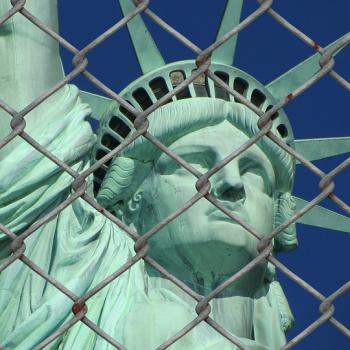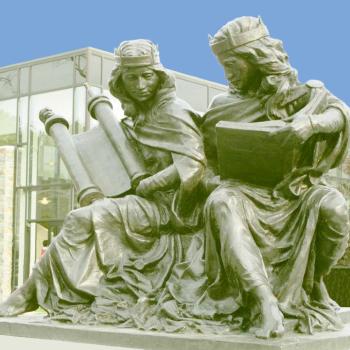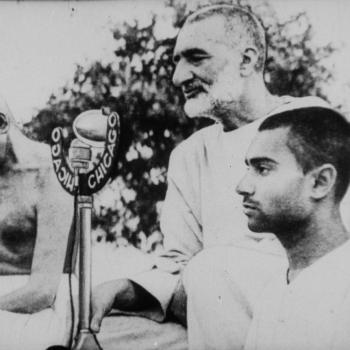Indeed, the church reproves every form of persecution against whomever it may be directed. Remembering then, its common heritage with the Jews and moved not by any political consideration, but solely by the religious motivation of christian charity, it deplores all hatreds, persecutions, displays of anti-semitism level at any time or from any source against the Jews. Nostra Aetate[1]
At the early stages of church history, Christians and Jews had a complex relationship with each other; while there were clear lines of demarcation distinguishing the two, they did not entirely separate from each other for centuries. Many of the conflicts between them reflected internal squabbles and power-struggles as various groups established different interpretations of the Law and the Prophets. While Christians were more welcoming to Gentiles and Gentile forms of thought, they still were centered upon a rather Jewish outlook to the world and its history, albeit a particular form of Jewish thought which contended against other, various attempts to reorganize and restructure Jewish thought as Jewish leaders had to reconsider the implications of the Torah and the Prophets in light of the destruction of a semi-autonomous Jewish state and the Temple in Jerusalem.
Divisions began to grow wider as the implications of the radically different foundations that existed between believers in Jesus as the messiah and those who denied his messianic legacy became realized. Jewish rebellion had caused Rome to have a militant response to the Jews, exiling them from their homeland, and yet many aspects of their relationship with Rome remained so that they could and would be allowed to hold on to their faith. Christians, on the other hand, had many advantages and disadvantages; the Gentile-converts were not given the same respect and tolerance as the Jews, because Roman authorities thought they should follow the norms established for the Empire, and yet this meant that they were also not forced into exile like the Jews; they could and would find themselves remaining in Israel even as Christianity spread throughout the known world. Christians were given social privileges, but they were expected, in return, to follow the common cult and therefore bow and sacrifice to Caesar as thanks.
In ante-Nicene era, Christians often took the heat from both Jews and Romans. While criticism from the Jews differed from that which was given the Romans, Christians often found the internal debate between Christians and Jews were picked up and taken into greater account by pagan sources, so that they had to face a rather haphazard combination of the two group, with Celsus representing one of the most learned examples of this anti-Christian tradition.
Thanks to the developing conflict which, in part, was based upon differences of Scriptural interpretation and different traditions which established those interpretations, many Christian began to write reactionary responses to the ongoing development in Jewish thought when it countered developing Christian interpretation. Early on this should be read more as a continuation of the internal debate between two differing schools of thought fighting each other seeking to take precedence; Christian criticism was not aimed at the Jews as a whole as much as a way of Jewish thought was developing, similar to the way the prophets in the Tanakh debated against other Jews. In this way, though some troubling statements were beginning to emerge, the content and thought was not aimed at the Jews in a hostile, anti-Semitic fashion, but in the rhetorical fashion of the prophets and the exaggeration of classical orators. Christians had to defend not only messianic claims for Jesus, but also his divinity and the new way of engaging the Law which he established. Christianity was not seen as repudiating or replacing the Torah, to the annoyance of several Gnostic sects, but as a way to read and understand it with an interpretation that centered itself upon Christ and his significance to the whole of salvation history. Much of the interpretative scheme the Christians took came out of the Jewish tradition; spiritualizing the Torah was not new, as the writings of Philo demonstrate. But Christians, under the lens of Christ, radicalized it, reorienting the interpretations to follow with the teaching of the Gospel. In this respect, when debating against the Jews, Christians were following a “Jewish way” of interpreting the Torah; it was not a debate of method as much as the outcome of that method.
The legacy of the early Jewish-Christian debate, however, slowly developed tendencies and strategies which would become reified and later read under a different, hostile light. Origen and Jerome could study with and learn from the Jews; Augustine could offer reasons why the Jews must be protected and respected, but when Christianity took full prominence in the world, the least bit of criticism against theological interpretations of the Jews turned into another factor to be used against the Jews themselves.
Indeed, what started as internal debates developed into stock forms of criticism which often was taken out of context by later generations. Both Jews and Christians alike followed with the stock forms given unto them, and slowly evolved in a way to reflect those stock forms more. They stopped listening to each other and fought not what the others believed, but what they had essentialized the other as being. Then, Christians and Jews alike, began to separate from each other. Christians were told to stop going to the synagogue, in part, because of the fear that Jewish forms of thought, already rejected, would be seen as needful for Christians, leading to a change in Christian theology; this is what was meant by the writings of St. John Chrysostom in his famous homilies, “Against the Jews;” as the translator of them indicated, it was not aimed at the Jews as much as “Judaizing Christians” who were seeking to change Christian thought to reflect later Jewish theological developments which countered Christians sentiments. Nonetheless, in his statements, however much they might follow the standards of rhetoric of his time, we must acknowledge the damage which was done; the language Chrysostom used against the Jews themselves in order to have Christians avoid the synagogues is clearly at the start of the tradition which would demonize Jews for centuries: he called them demon-possessed Christ-killers who, because of pursuit of worldly pleasures, had lost their place with God. This is unacceptable and is to be denounced even if Chrysostom is the one who said them, because once the style and genre was forgotten, the words were quickly literalized and absolutized, allowing for and promoting the death of the Jews.
And yet, in the time of Chrysostom, while the demarcation had not entirely stuck by either side, it would be enforced; it was not full-fledged anti-Semitism, though once again, the arguments used in such discourses, trying to keep Christians pure in their Christianity, easily led to criticism of Jewish ways of thought that ended up becoming the foundation of much later anti-Semitism. Apologetics interpreted in non-apologetical ways led to all kinds of hate against the Jews, thinking of them as not only willfully ignorant, but evil for their contention against the Christian faith. Christians, who should have known better, who should have sought unity in brother love with the Jews because of their common heritage, let their position in the world get the best of them, and slowly taking on the worst aspects of early apologetics, they led to all kinds of anti-Jewish sentiments which added all kinds of rumors and gossip as a means of creating vile propaganda denigrating the Jewish people, justifying immoral abuse against them.
Even when Christians like St. Augustine said it was the duty of the state to protect the Jews from abuse, the method which was used for such protection was easily turned against itself and used by anti-Semites as a way to keep the Jews down (thus, the development of the Jewish Ghetto, begun with the best intentions, led to the establishment of hellish treatments against the Jews).
The history behind anti-Semitism, the crafty but deplorable way in which propagandists twisted and abused theological literature and added to it the contentions that developed through xenophobia, should be kept in mind in the present age as we see similar mistreatment easily develops against others for the same cause as reason. Xenophobia combined with abuse of theology leads to the development of hate groups which seeks to destroy the other for being other, seeking the minutest difference as just cause for their elimination. Generalization is easily turned into objectification, so that even if such generalizations at first are established with an attempt to protect the other, they easily are taken up and used for the justification of cruelty later when those good intentions are forgotten. Thus, what once happened with the Jews, and still happens with many deplorable Christians with their response to the Jews, is found to happen also Islam: historical theological debates are now being used by Christians to suggest ill of Muslims. Stock notions and criticism, however invalid, are being reinforced by xenophobic literature to justify abuse of and outright war with all Muslims. Human rights are ignored as religious liberty is entirely denied.
This is why Christians must constantly overturn any inclination for polemics which lead to the hate of some other. Christians certainly can and should proclaim their faith in a positive form, explaining why they believe as they do, but they can and should do it in a way which is not hostile to the other. Christians should let the others defines themselves without attempt to define the other in the most terrible forms possible; such rhetoric only establishes hate and reinforce the conflict, leading to no one actually listening to or understanding each other. We must be willing to listen the other, hear what they believe instead of trying to impute the worst possible beliefs upon them, so we can learn from them and change our own views of them, removing all false, distorted ideas we have of them in the process. We must reach out and love the other, if for no other reason as that is the command of Christ; if we do not do so, we find ourselves the one who is in the worst position, because we end up repudiating the one who we claim to believe, Jesus, who said we must love even our enemies for his own sake.
[IMG=Christ Among the Doctors by Giotto di Bondone [Public domain], via Wikimedia Commons]
[1] Nostra Aetate in Vatican Council II: Constitutions, Decree and Declarations. ed. Austin Flannery, OP (Northport, NY: Costello Publishing Company, 1996), ¶4.
Stay in touch! Like A Little Bit of Nothing on Facebook

















